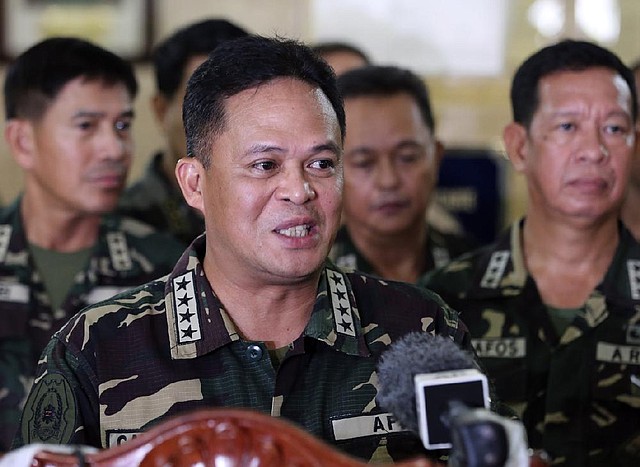Filipinos hail troops' escape near Syria
Philippine military chief Gen. Gregorio Pio Catapang answers questions from reporters about the situation of Filipino peacekeepers in Golan Heights, during a press conference at Camp Aguinaldo military headquarters in suburban Quezon city, Philippines on Sunday Aug. 31, 2014.Catapang said more than 70 Filipino peacekeepers have escaped from two areas in the Golan Heights that came under attack by Syrian rebels. (AP Photo/Aaron Favila)
Monday, September 1, 2014
BEIRUT -- Under cover of darkness, 40 Filipino peacekeepers escaped their besieged outpost in the Golan Heights after a seven-hour gunbattle with Syrian rebels, Philippine officials said Sunday. Al-Qaida-linked insurgents still hold captive 44 Fijian troops.
The getaway, combined with the departure of another entrapped group of Filipino troops, marked a major step forward in a crisis that began Thursday when Syrian rebels started targeting the peacekeeping forces. The U.N. Security Council has condemned the assaults on the international troops monitoring the Syrian-Israeli frontier and has demanded the unconditional release of those still in captivity.
The crisis began after Syrian rebels overran the Quneitra crossing -- on the de facto border between Syrian- and Israeli-controlled parts of the Golan Heights -- on Wednesday. A day later, insurgents from the al-Qaida-affiliated Nusra Front seized the Fijian peacekeepers and surrounded their Filipino colleagues, demanding they surrender.
The Filipinos, occupying two United Nations encampments, refused and fought the rebels Saturday. The first group of 35 peacekeepers was then successfully escorted out of a U.N. encampment in Breiqa by Irish and Filipino forces on board armored vehicles.
The remaining 40 peacekeepers were besieged at the second encampment, called Rwihana, by more than 100 gunmen who rammed the camp's gates with their trucks and fired mortar rounds. The Filipinos returned fire in self-defense, Philippine military officials said.
At one point, Syrian government forces fired artillery rounds from a distance to prevent the Filipino peacekeepers from being overwhelmed, said Col. Roberto Ancan, a Philippine military official who helped monitor the standoff from the Philippine capital, Manila, and mobilized support for the besieged troops.
"Although they were surrounded and outnumbered, they held their ground for seven hours," Philippine military chief Gen. Gregorio Pio Catapang said, adding that there were no Filipino casualties. "We commend our soldiers for exhibiting resolve even while under heavy fire."
As night fell and a cease-fire took hold, the 40 Filipinos fled with their weapons, traveling across the hills for nearly two hours before meeting up with other U.N. forces, who escorted them to safety early Sunday, Philippine officials said.
"We may call it the greatest escape," Catapang told reporters in Manila.
The Syrian and Israeli governments, along with the United States and Qatar, provided support, the Philippine military said without elaborating.
With the Filipinos now safe, full attention turned to the Fijians who remain in captivity.
Military Commander Brig. Gen. Mosese Tikoitoga said Sunday that contacts on the ground in the Golan Heights have assured the military of the captured soldiers' well-being, the report said.
He said a U.N. negotiation team and Fijians in Syria were working toward the peacekeepers' release.
The Nusra Front, meanwhile, confirmed that it had seized the Fijians. In a statement posted online, the group published a photo showing what it said were the captured Fijians, saying the men "are in a safe place and in good health, and everything they need in terms of food and medicine is given to them."
The statement mentioned no demands or conditions for the peacekeepers' release.
Elsewhere, Lebanon's military said Sunday that the Nusra Front had released five members of the Lebanese security forces captured in August during a cross-border raid.
The men were taken hostage when militants from Syria took over the Lebanese border town of Arsal for five days before withdrawing toward the Syrian frontier, taking with them Lebanese soldiers and policemen as hostages.
The National News Agency said Sunday that the Nusra Front freed the five men late Saturday. The Lebanese army confirmed their release in a statement.
The Nusra Front said it freed the Lebanese solders because they are Sunnis, and told Lebanon's Sunni community that the men's release is "proof of our love for you since you are our family."
The Nusra Front has accused the U.N. of doing nothing to help the Syrian people since the uprising against President Bashar Assad began in March 2011. It said the Fijians were seized in retaliation for the U.N.'s ignoring "the daily shedding of the Muslims' blood in Syria" and colluding with Assad's army "to facilitate its movement to strike the vulnerable Muslims" through a buffer zone in the Golan Heights.
The U.N. mission in the Golan Heights, which began with a 1974 disengagement between Israel and Syria, has 1,223 troops from six countries: Fiji, India, Ireland, Nepal, Netherlands and the Philippines. A number of countries have withdrawn their peacekeepers because of the escalating violence.
Information for this article was contributed by Oliver Teves, Maamoun Youssef, Rod McGuirk and Peter Enav of The Associated Press.
A Section on 09/01/2014
